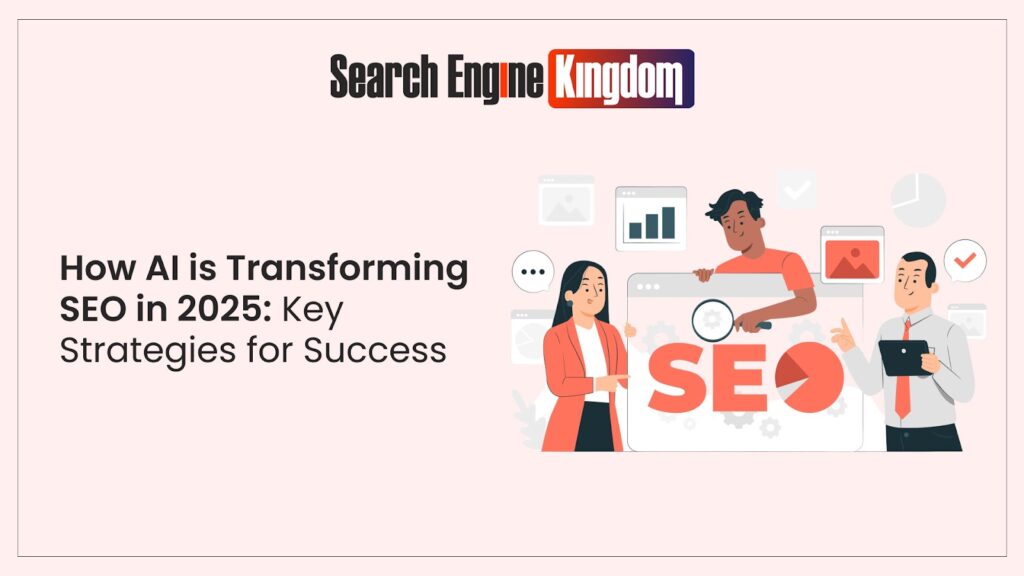
If you’re still optimizing your website the same way you did five years ago, you’re already falling behind. In 2025, how AI is changing SEO is more evident than ever—it’s no longer optional but a driving force behind the industry’s evolution. From personalized search experiences to predictive analytics, AI is redefining how businesses approach SEO and rank in search engine results.
Let’s dive into how AI is changing the game and what strategies you can adopt to stay ahead.
AI-Powered Personalization: The New Normal
In 2025, search engines are delivering hyper-personalized results tailored to individual user preferences, thanks to AI algorithms.
Search engines like Google now analyze user behavior more deeply than ever. Factors such as browsing history, location, and even real-time context are influencing rankings. How AI is changing SEO can be seen in the way search engines personalize results, making it crucial for businesses to adapt.
Strategy:
- Create User-Focused Content: Use AI tools to analyze audience preferences and develop content that directly answers their questions or meets their needs.
- Optimize for Local Search: Personalization often ties to location, so ensure your local SEO is airtight.
- Use Dynamic Content: Tools like chatbots or recommendation engines can serve personalized content to users on your site.
AI and Content Creation: Quality Over Quantity
AI tools like ChatGPT and Jasper AI have revolutionized content creation. But in 2025, it’s not just about creating more content—it’s about creating smarter content.
What’s Changed?
Search engines are increasingly adept at detecting thin, low-quality, or AI-generated content that doesn’t provide real value.
Strategy:
- AI-Assisted Research: Use AI tools to analyze trending topics, keyword opportunities, and competitor strategies.
- Human Oversight: Blend AI efficiency with human creativity to ensure your content is both optimized and genuinely engaging.
- Optimize for E-E-A-T: (Experience, Expertise, Authoritativeness, Trustworthiness) remains crucial. AI can help, but authoritative input is essential.
Voice and Visual Search: A New Frontier
With the widespread adoption of smart assistants and AI-powered image recognition, voice and visual search are dominating the SEO landscape.
What’s Changed?
More users are conducting searches by speaking to devices or uploading images, and search engines have adapted accordingly.
Strategy:
- Natural Language Optimization: Focus on long-tail keywords and conversational phrases that mimic spoken queries.
- Schema Markup: Implement structured data to help search engines understand your content better.
- Image Optimization: Use high-quality images with relevant alt text and file names to rank in visual search results.
Predictive Analytics for Smarter Decisions
AI-driven predictive analytics are empowering marketers to make informed decisions about their SEO strategies.
What’s Changed?
Tools like Google Analytics 4 and other AI platforms provide forecasts on traffic trends, user behavior, and even keyword performance.
Strategy:
- Leverage Predictive Tools: Use AI-based analytics to identify trends before they peak.
- Monitor User Behavior: Track how users interact with your site and adjust your content or layout accordingly.
- Stay Agile: Be ready to pivot based on data insights to stay competitive.
AI-Driven Link Building
In 2025, link-building isn’t about quantity but quality, and AI is streamlining the process.
What’s Changed?
AI tools can now identify high-authority link opportunities, analyze competitor backlinks, and even automate outreach campaigns.
Strategy:
- Competitor Analysis: Use AI to study your competitors’ backlink profiles and uncover opportunities.
- Personalized Outreach: Automate and personalize outreach emails for link-building using AI.
- Diversify Anchor Text: Ensure your backlinks look natural by varying your anchor text—AI tools can suggest variations.
The Future of SERPs: Zero-Click Searches
Featured snippets, knowledge graphs, and other zero-click features are becoming more common, largely driven by AI.
What’s Changed?
Users often get their answers directly on the SERP (Search Engine Results Page), meaning fewer clicks to your site.
Strategy:
- Optimize for Snippets: Structure your content to answer questions directly, increasing the chance of being featured.
- Focus on On-Page Engagement: If users land on your site, make sure it’s engaging enough to keep them there.
- Track SERP Features: Use tools to monitor how your site appears in search results beyond traditional rankings.
Conclusion: Adapting to the AI Revolution
AI isn’t a luxury in SEO anymore it’s a necessity. How AI is changing SEO shows in the way search engines prioritize personalized content, predictive analytics, and smarter rankings. By using AI-driven tools and strategies, you can stay ahead in the evolving search landscape and keep your site competitive. The possibilities are endless but only if you take action.
Ready to dominate SEO in 2025? How AI is changing SEO is reshaping the game, and Search Engine Kingdom is here to guide you to the top. The future is now—embrace AI and stay ahead!
